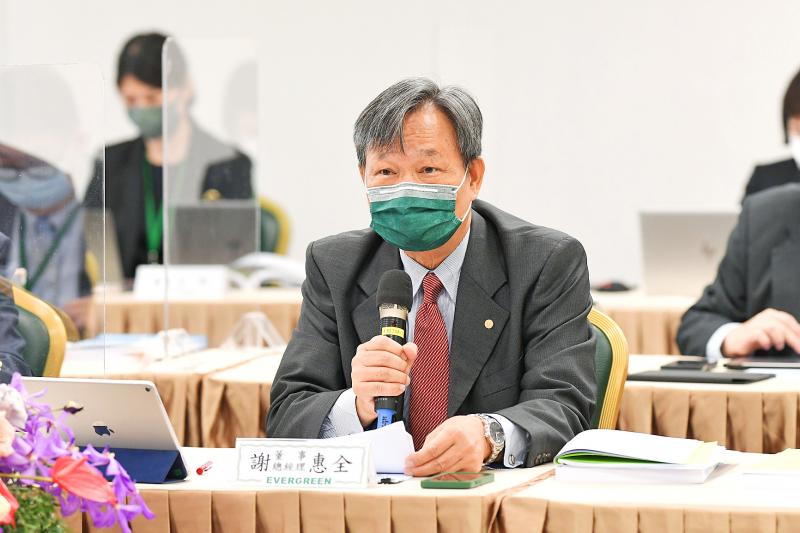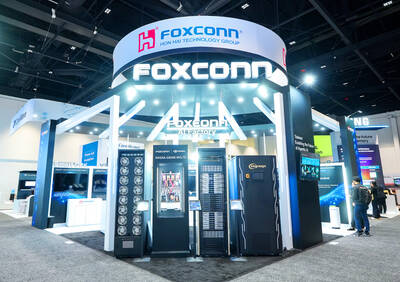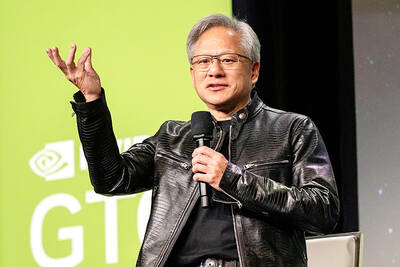Evergreen Marine Corp’s (長榮海運) proposed capital reduction was yesterday approved by shareholders, despite an objection from a major shareholder, Evergreen International Corp (長榮國際).
About 79 percent of the company’s shareholders attending its annual general meeting in Taipei approved the proposal, enabling Evergreen Marine to reduce its capitalization by 60 percent and return NT$31.7 billion to shareholders, or NT$6 per share, the company said.
Evergreen International Corp, which holds a 4.96 percent stake in Evergreen Marine, objected to the proposal, with its attorney, Wu Chu-chun (吳祝春), saying before the vote that if Evergreen Marine thinks its capital is more than sufficient, it should retire its treasury stocks rather than conduct a capital reduction.

Photo: CNA
Taiwan Depository and Clearing Corp (集保) data showed that about 260,000 minor Evergreen Marine shareholders own 516 million shares, with each shareholder owning 1,980 shares on average.
A conservative estimate shows that after the capital reduction, about 130,000 minor shareholders would each own fewer than 1,000 shares, and with this low number of shares, they would find it inconvenient to trade the stock on the market, Evergreen International said.
Evergreen International said that it doubted Evergreen Marine had decided to reduce its capital to benefit major shareholders.
“Is it possible that major shareholders who have purchased Evergreen Marine’s convertible bonds can take advantage of this opportunity and make significant profit from getting their cash back without paying any tax? Is it possible for them to obtain shares through their convertible bonds later and thus obtain a greater share of the profit that belongs to all shareholders?” Evergreen International said in a statement.
In response, Evergreen Marine vice president Wu Kuang-hui (吳光輝) said that the shipper decided to conduct the 60 percent capital reduction because its common stock equity would fall to 7 percent, in line with the ratios of other major global shippers.
“We made profits of NT$238.4 billion last year and NT$109.8 billion in the first quarter, and we will not purchase new vessels in the near term. We are reducing capital mainly to cut idle money,” Wu said.
The capital reduction would not prevent Evergreen Marine from implementing new investment plans and would not increase its capital in the short term, or it would face severe criticism from investors, he said.
At the shareholders’ meeting, Evergreen Marine president Eric Hsieh (謝惠全) said he still holds an upbeat outlook regarding the company’s revenue growth for the whole of this year, adding that inflation and Russia’s invasion of Ukraine should not affect the shipping industry significantly.
In addition, inflation would not stop consumers from buying daily necessities, and since sea liners mostly transport necessities, cargo demand would not slow down, while Russia and Ukraine do not make up a big share of the container market, Hsieh said.

Anna Bhobho, a 31-year-old housewife from rural Zimbabwe, was once a silent observer in her home, excluded from financial and family decisionmaking in the deeply patriarchal society. Today, she is a driver of change in her village, thanks to an electric tricycle she owns. In many parts of rural sub-Saharan Africa, women have long been excluded from mainstream economic activities such as operating public transportation. However, three-wheelers powered by green energy are reversing that trend, offering financial opportunities and a newfound sense of importance. “My husband now looks up to me to take care of a large chunk of expenses,

State-run CPC Corp, Taiwan (CPC, 台灣中油) yesterday signed a letter of intent with Alaska Gasline Development Corp (AGDC), expressing an interest to buy liquefied natural gas (LNG) and invest in the latter’s Alaska LNG project, the Ministry of Economic Affairs said in a statement. Under the agreement, CPC is to participate in the project’s upstream gas investment to secure stable energy resources for Taiwan, the ministry said. The Alaska LNG project is jointly promoted by AGDC and major developer Glenfarne Group LLC, as Alaska plans to export up to 20 million tonnes of LNG annually from 2031. It involves constructing an 1,290km

NEXT GENERATION: The company also showcased automated machines, including a nursing robot called Nurabot, which is to enter service at a Taichung hospital this year Hon Hai Precision Industry Co (鴻海精密) expects server revenue to exceed its iPhone revenue within two years, with the possibility of achieving this goal as early as this year, chairman Young Liu (劉揚偉) said on Tuesday at Nvidia Corp’s annual technology conference in San Jose, California. AI would be the primary focus this year for the company, also known as Foxconn Technology Group (富士康科技集團), as rapidly advancing AI applications are driving up demand for AI servers, Liu said. The production and shipment of Nvidia’s GB200 chips and the anticipated launch of GB300 chips in the second half of the year would propel

‘MAKE OR BREAK’: Nvidia shares remain down more than 9 percent, but investors are hoping CEO Jensen Huang’s speech can stave off fears that the sales boom is peaking Shares in Nvidia Corp’s Taiwanese suppliers mostly closed higher yesterday on hopes that the US artificial intelligence (AI) chip designer would showcase next-generation technologies at its annual AI conference slated to open later in the day. The GPU Technology Conference (GTC) in California is to feature developers, engineers, researchers, inventors and information technology professionals, and would focus on AI, computer graphics, data science, machine learning and autonomous machines. The event comes at a make-or-break moment for the firm, as it heads into the next few quarters, with Nvidia CEO Jensen Huang’s (黃仁勳) keynote speech today seen as having the ability to